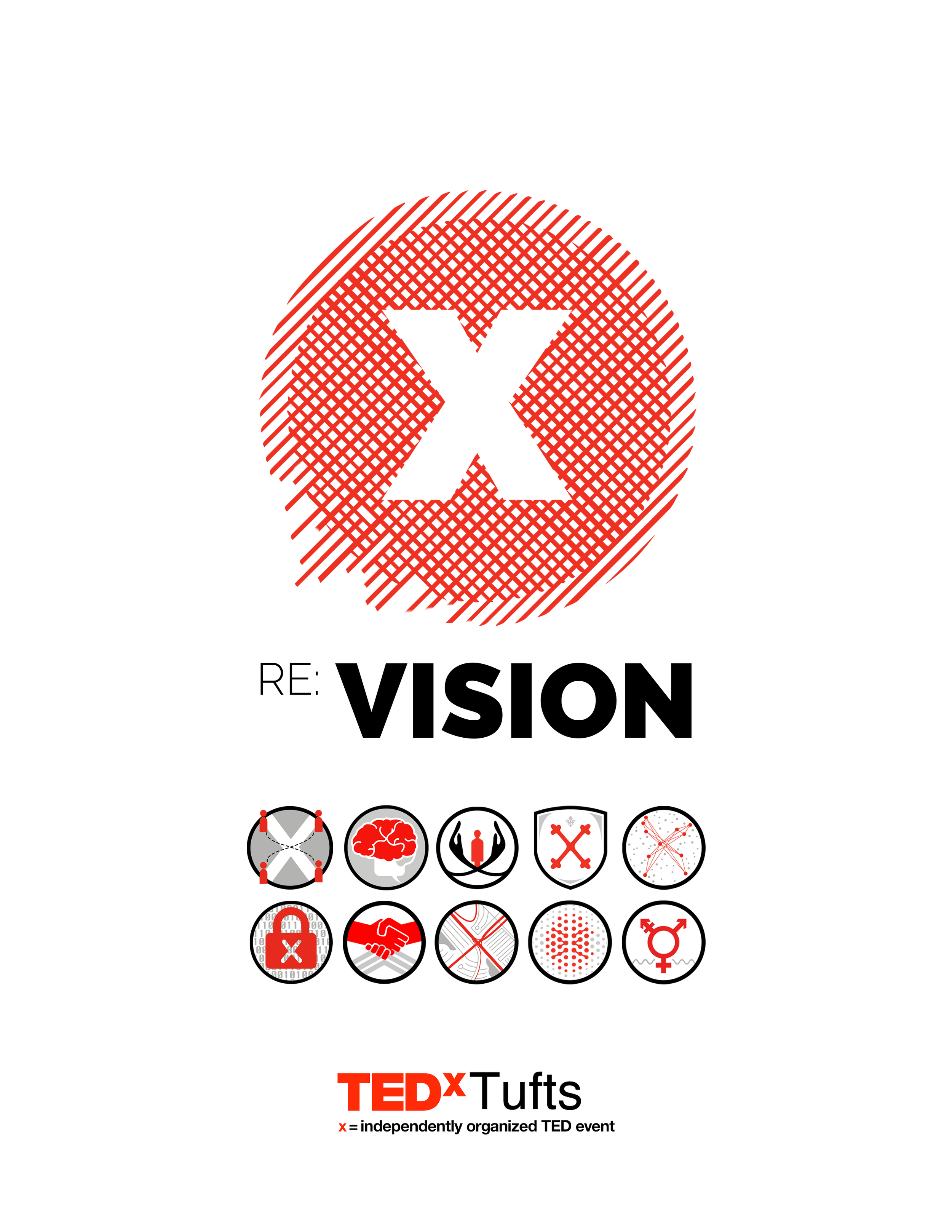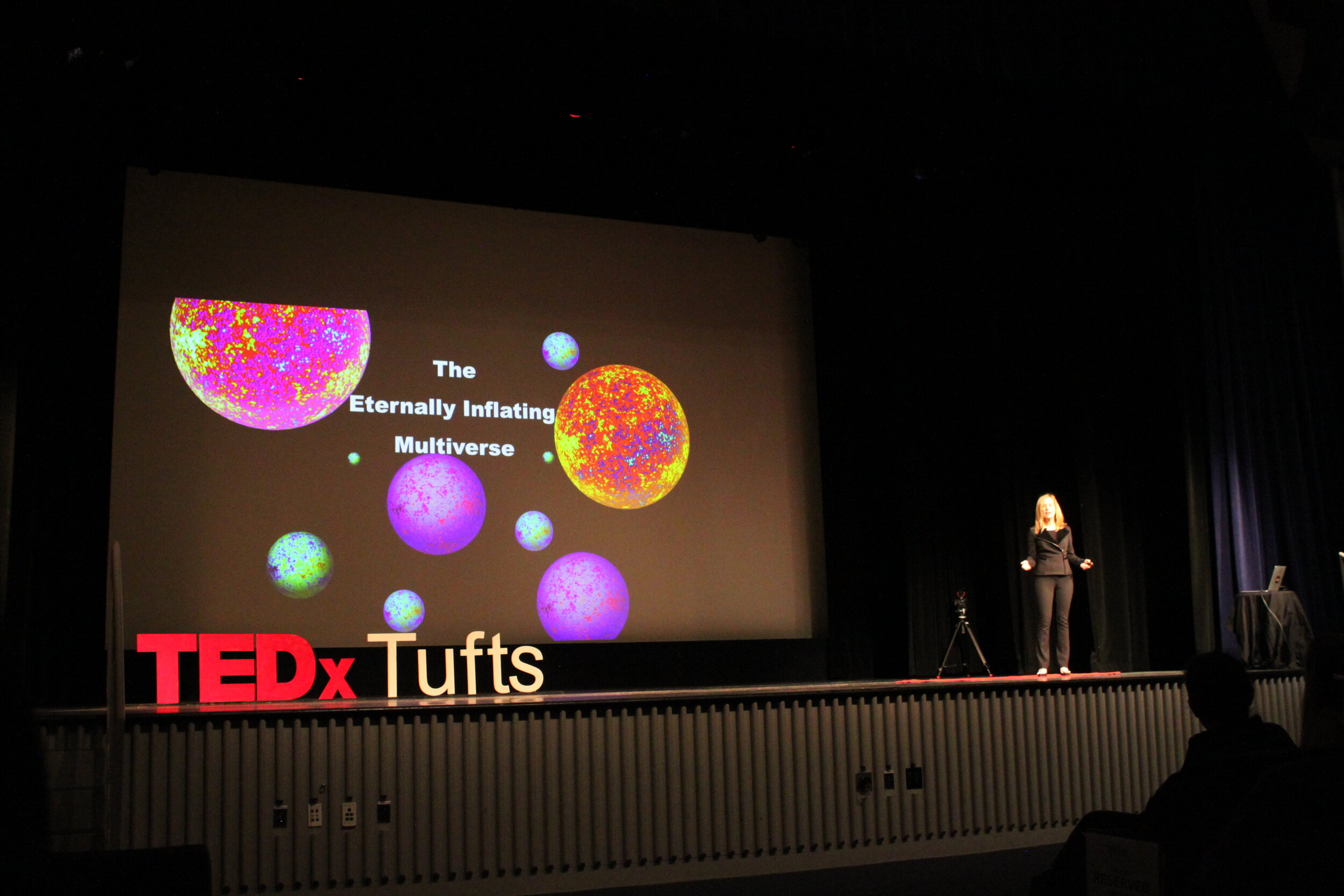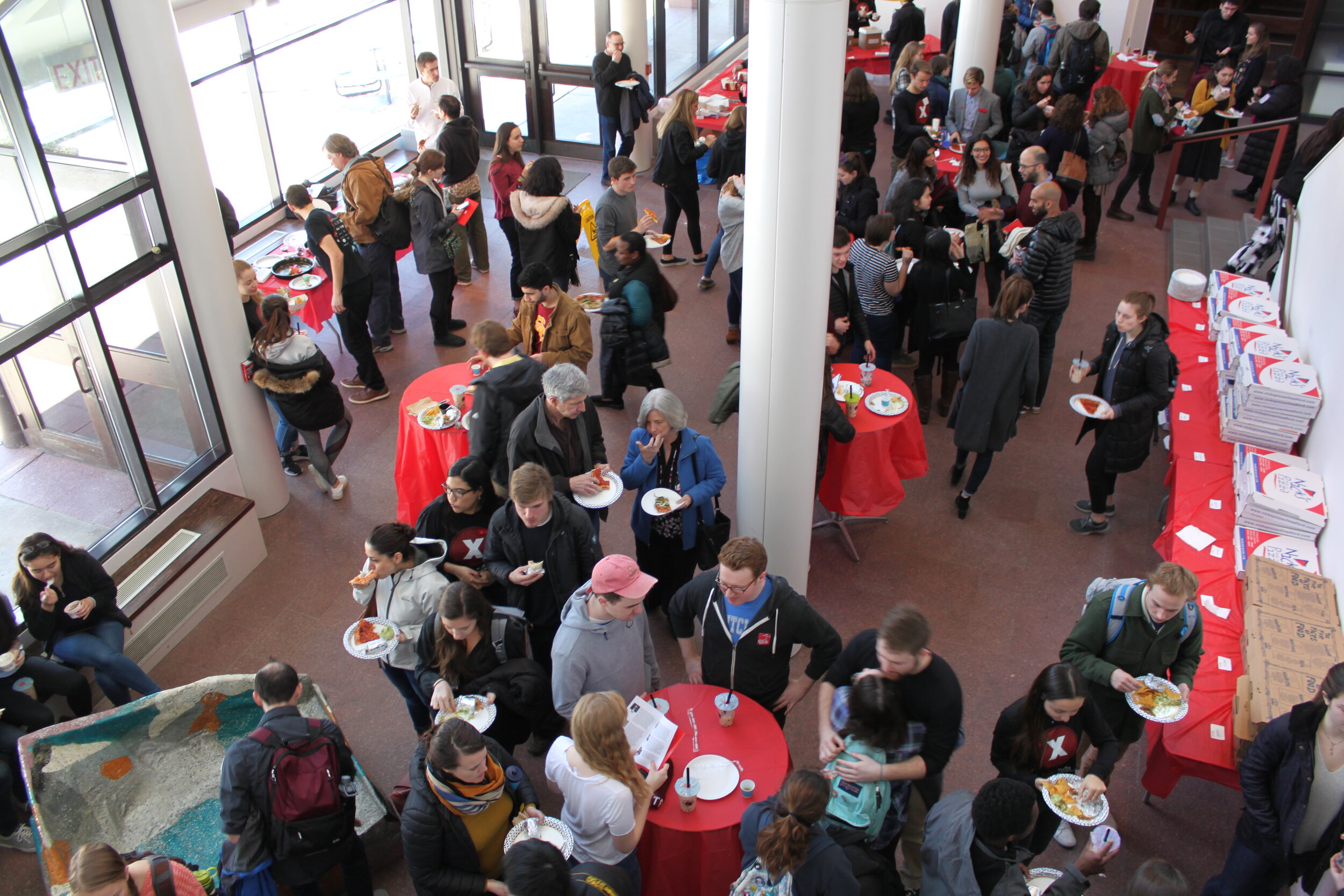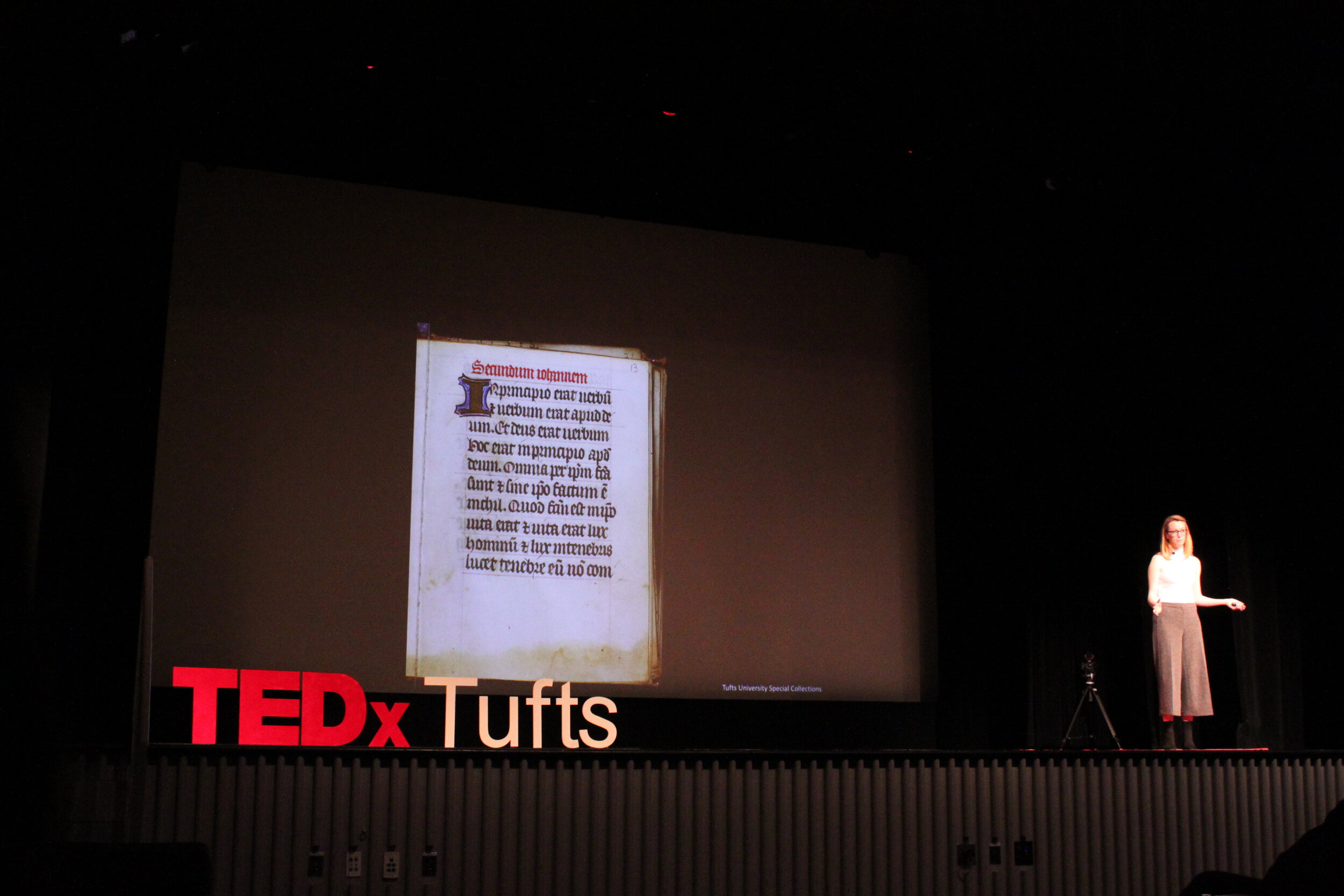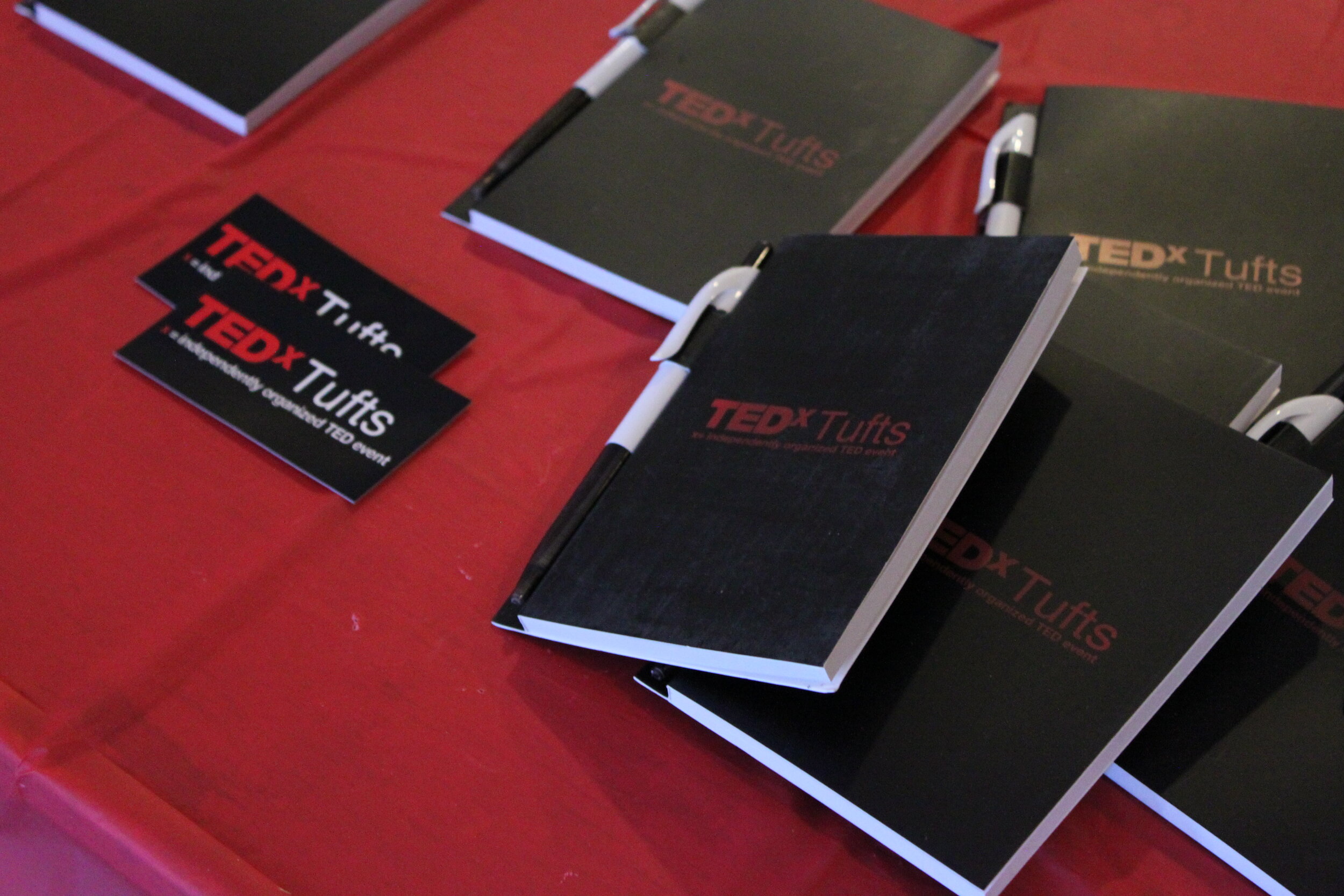
Re:Vision
2018
Our theme challenges those who come to our event to not only to take a second look at concepts that have settled into “normalcy,” but also tasks our viewers to consider sight itself, and how ones own position can affect the understanding of those same concepts. Whether it’s urban design, cyber security, or countless other concepts that we think we fully understand, TEDxTufts’ 2018 speakers will show how simply a second look, and a recognition of one’s own position to the topic, can refocus and and reintegrate crucial paradigms in order to better our understanding of the world around us.
Talks:

Alexandra Tarzikhan is a JD/MPH student at Northeastern School of Law and Tufts School of Medicine. She left her hometown of Aleppo, Syria in 2011, right at the start of the war. In 2015, when she began to hear about the magnitude of the refugee crisis, she felt the need to go and do something about it. This November was her third time volunteering in Lesvos, Greece, and she has also visited several camps in Lebanon and Jordan. Now that she is back in Boston, she wants to try to help resettled Syrians here. She believes that all of the refugees she met while volunteering, can succeed if only they had access to the opportunities she did. She believes in leveraging oneself to empower others, which is why she started a social media page called Meet A Refugee, as a way of raising awareness through the sharing of their stories. Her talk aims to raise awareness about the refugee crisis and humanize the issue rather than discussing it from a political or legal perspective.

Benya Kraus is a Tufts alum who majored in International Relations and double-minoring in Urban Studies and Colonialism Studies. She’s been involved in Amnesty International USA on several different levels, including currently as a member of the Board’s Priorities Subcommittee, researching and conducting consultations on the development of the organization’s human rights priorities and campaigns. Her passion for human rights is supplemented with a focus on international security, spending a summer working as an Oslo Scholar with Global Goals Advocate and UN High-Level Commissioner Dr. Alaa Murabit on the intersections of health, security, gender.

Delia Perlov’s research interests are focused on the eternally inflating multiverse and touch on various aspects of cosmology, string theory, quantum field theory and general relativity. She got her MSC and Ph.D. from Tufts University and then spent several years working as a postdoctoral fellow, also at Tufts, where she now lectures on a part-time basis. Her first book, “ Cosmology for the Curious” (co-authored with Alex Vilenkin, 2017) aims to bring anyone with a cosmological sense of wonder and a facility with high school algebra up to date with modern cosmology.

Ea Domke is a Boston based artist, Post Graduate Teaching Fellow, alumna, and transgender activist. She earned a Master of Fine Arts from the School of the Museum of Fine Arts at Tufts in May of 2017. Some of Ea’s recent accomplishments include; a Post Graduate Teaching Fellowship, the Katherine Romero Graduating Student Award, and the Dean’s Scholarship Award for the academic year in 2015 and 2016. Her artistic practice explores; gender issues, transgender identity, the transgender body, often beginning with her own, the processes of transition, internalized emotional distress caused by social trauma, the negative physical manifestations caused by repeated traumas, and the triumph and joy of the transgender spirit.Her art projects deal with transgender identity, the transwoman’s body, which is her body, transition, internalized emotional distress caused by social trauma, the negative physical manifestations caused by repeated traumas, and the triumph and joy of the transgender spirit.

Jonathan Gillis is a master’s candidate at the Fletcher School of Law and Diplomacy. He previously spent four years in the United States Marine Corps as a machine gunner and combined anti-armor team (CAAT) section leader. After leaving the Marines last summer, he began to notice that many people, especially in cities, have very little interaction with the military. The public understanding of veterans is largely informed by movies and news articles, many of which tend to fit military personnel into the role of hero, villain, or victim. Those characterizations are not accurate, but they can have a major impact on how we interact with veterans, and even how we approach defense policy. His talk is about the true, human side of the armed forces.

Katie Hyten works as the Director of Program Operations at Essential Partners, training groups in effective communication across differences, facilitating conversations in communities as they navigate difficult moments, and supporting internal operations and evaluation within the organization. Outside of Essential Partners, she is a mediator and an independent consultant in conflict resolution processes focused on teaching negotiation, facilitating groups, and coaching mediators. She wants to encourage people to think intentionally about the way they set up conversations in their school, work, and home lives.

Mary Travers graduated from Tufts in 2018 and studied Art History and French. She is curious about understanding history through the stories of individual interactions— both between objects and people. Mary also played on the varsity field hockey team and was the co-president of the Protestant Student Association.

Megan Zella Rounseville is a PhD student at The Fletcher School at Tufts University studying Development Economics and Impact Evaluation. She also works as an Economist for the World Bank designing and implementing impact evaluations in Latin America. Her current research applies econometrics to the study of poverty and inequality, child nutrition, adolescent sexual and reproductive health, access to justice, aspirations, and behavioral economics. Megan has over ten years of development work experience from the grassroots level as a Peace Corps volunteer on the Haitian-Dominican border to policy and research advising in Ecuador, Colombia, and Peru.

Sam Usher studied Engineering Psychology at Tufts University. He is specifically interested in Neuromarketing and Consumer Psychology. His interest in Neuromarketing developed after working at Nielsen Consumer Neuroscience, a Neuromarketing company that uses a variety of neuroscience technologies to analyze the effectiveness of advertising, packaging, in-store elements, and more. Sam believes that advertising and marketing affect us every single day, and he thinks it’s important to be aware of the psychology and neuroscience that is being used to target consumers.

Winnona DeSombre is an alumnus (A'18) who studied Computer Science and International Security at Tufts University. Her passion is in cybersecurity: aside from having been a teaching assistant for the Computer Security course at Tufts, she also works for threat intelligence startup Recorded Future. Her talk illustrates the importance of the cybersecurity in our world today.

